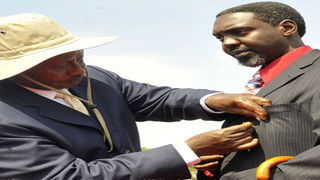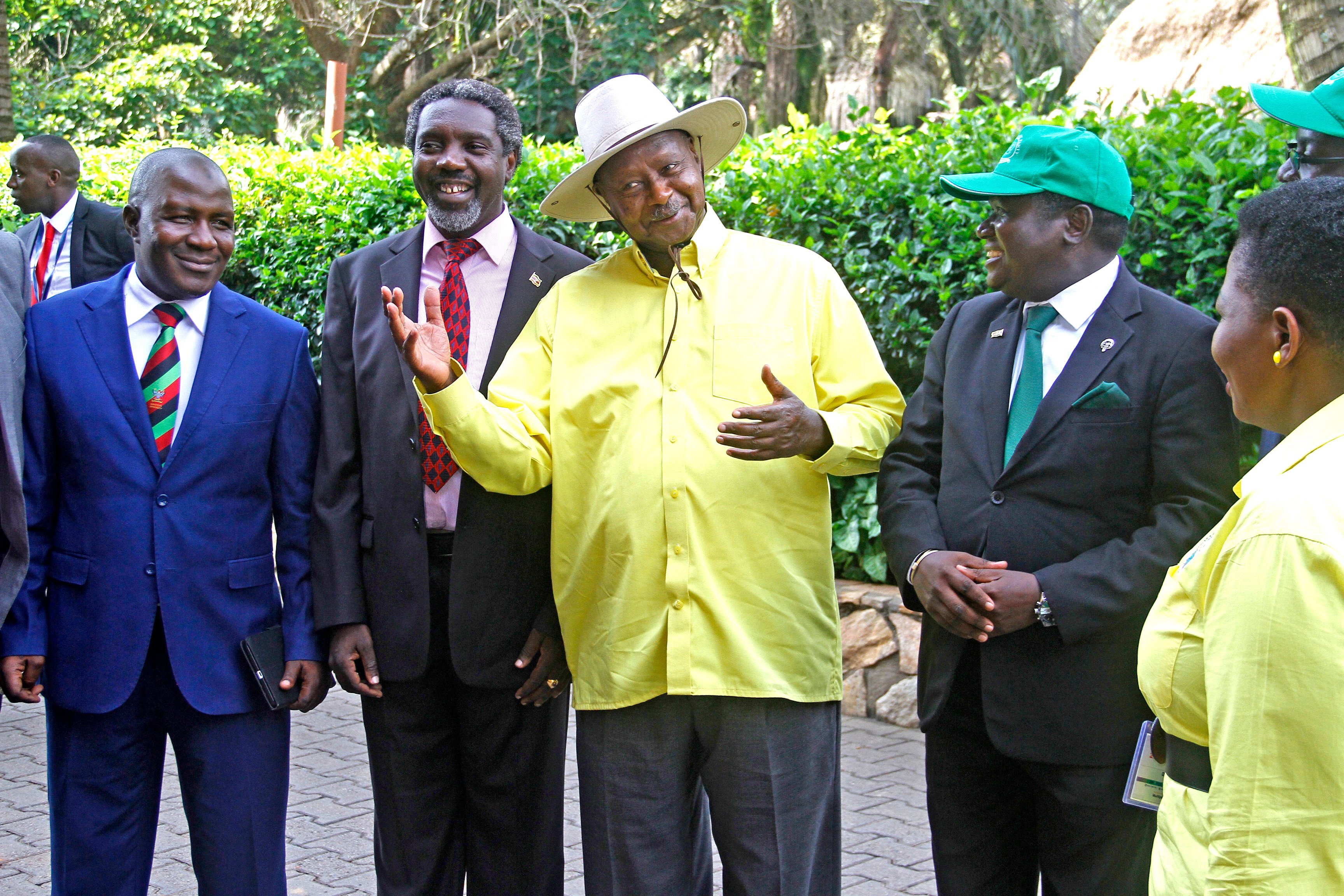
UPC leader Mr Jimmy Akena (R) receives the Independence Day Medal awarded to his father (Milton Oboto) posthumously. PHOTO/FILE
|People & Power
Prime
What does the future hold for NRM and UPC marriage Eala failure?
What you need to know:
- President Museveni’s Machiavellian political manoeuvring appears to prevail even as some of his erstwhile Opposition-cum-allies appear to have been given a bad deal.
- The recent East African Legislative Assembly polls have left the Jimmy Akena-led UPC faction with egg on face.
More than six years ago, a broad-based pre-electoral alliance, The Democratic Alliance (TDA), collapsed long before Ugandans went to the polls in the 2016 General Election.
The idea behind TDA was to field a strong joint candidate against the incumbent to better the chances of defeating President Museveni in the 2016 polls.
TDA membership was comprised of, among others, the Forum for Democratic Change (FDC), Democratic Party (DP), Uganda Peoples Congress (UPC), People’s Progressive Party (PPP), Conservative Party (CP), Justice Forum (JEEMA) and Uganda Federal Alliance (UFA).
There were also pressure groups backing the likes of former vice president Gilbert Bukenya and former prime minister Amama Mbabazi.
Hours after he was declared winner of the February 18, 2016, presidential election – the polls in which the joint Opposition under TDA would have fielded a candidate – President Museveni vowed that he would have no Opposition left by the time of the 2021 General Election.
The success of that proclamation is subject to debate. What is clear, however, is that after thwarting the efforts under TDA and being declared winner of the 2016 polls, the incumbent went to work.
With the exception of a few like former FDC presidents Kizza Besigye and Mugisha Muntu, he has successfully co-opted most of the key figures under TDA or pushed others in either retirement or silence.
Former VP Bukenya and ex-prime minister Mbabazi seem to have returned to the fold with Mbabazi named by Mr Museveni as his special envoy.
Ms Beti Olive Kamya’s Uganda Federal Alliance (UFA) seems to have retired with her ministerial appointments after the 2016 polls. She currently serves as the Inspector General of Government (IGG).
PPP and CP have not played any significant role.
UPC and Eala
President Museveni’s Machiavellian political manoeuvring appears to prevail even as some of his erstwhile Opposition-cum-allies appear to have been given a bad deal.
The recent East African Legislative Assembly (Eala) elections may have left the Jimmy Akena-led UPC faction with egg on face but all indications show that the group will stick to the deal with President Museveni. UPC is Uganda’s second oldest political party.

Lira Municipality MP Jimmy Akena (C) is declared winner of a controversial UPC party presidency in 2015. The party has since been split into two. PHOTO/FILE
In 2015, President Museveni and the Akena faction of UPC entered some arrangement whose specific details remain unknown. There are reports that long before this became public, the Akena group was already working with the incumbent and the ruling National Resistance Movement (NRM) and partially explains the support the Akena backed candidates continued to receive from NRM during Eala elections.
The State machinery was also present to block the eviction of Akena and his team from Uganda House which houses the UPC headquarters.
A former party official tells Monitor that the Akena group have limited options and will take whatever President Museveni and his team have to offer.
This, the former official who requested not to be named because they don’t want to be sucked in their party’s “controversies”, says explains why President Museveni did not stamp his authority and prevail on the NRM legislators to back the UPC candidate in the polls.
The long arm of the Executive and the parliamentary leadership was key in ensuring that the DP nominee, Gerald Siranda, was elected. Of those declared winner by Speaker of Parliament Anita Among, Mr Siranda had the least the votes.
The winners were Rose Akol (422), Dennis Namara (415), James Kakooza (405), George Odongo (403), Paul Musamali (401), and Mary Mugenyi (367) – all NRM. Independent candidates were Veronica Babirye Kadogo (383) and Jacqueline Amongin (338), and DP’s Gerald Siranda (233).
While clearing the six incumbent members of Eala from NRM, President Museveni on July 8 included on his list Mr Siranda and directed NRM legislators to vote an independent MP and any other Opposition MP outside of National Unity Platform (NUP) and FDC.
Ideally, this should have been the UPC candidate. Supporting Siranda for Eala is part of the cooperation agreement DP president Norbert Mao recently signed with President Museveni. Mr Mao has already assumed his duties as Justice and Constitutional Affairs minister, also part of the deal with another State ministerial portfolio expected to go to the party.
Limited options for Akena
Even if they were to leave, the former UPC official says, the Akena group would have much more to lose than President Museveni who enjoys strong support in Akena’s backyard of Lango.
The incumbent with deep pockets and State projects would also have at least three years to recover even if Akena’s UPC walked out of the marriage with NRM. The ruling party has more than 20 legislators of the about 32 which come from the sub-region.
President Museveni has also pacified Mao’s Acholi sub-region. In a treatise published on the ruling NRM party website, Richard Todwong, the NRM secretary general, argues that the party’s support in Acholi and the northern region started from “offering a different narrative to the population about the [Lord’s Resistance Army] war”.
He attributes the party’s “massive support” to a population that got fed up of insecurity, and increased social and physical infrastructural projects such as schools, hospitals, roads and extension of electricity to many rural areas. Other things are President Museveni’s emphasis on household income.
“The people openly appreciated President Museveni politics of no revenge and they never wanted anything that would take them back to war,” he says.
Writing in June 2021 about “President Museveni, NRM and the political trends in Uganda”, the executive director of the Uganda Media Centre, Mr Ofwono Opondo, warns the ruling party against relaxing per its gains in Lango and Acholi.
The loss of Buganda, Busoga, and the continued jitters in Kasese, he says, should be grave warning signs that all is not well.
“Many will try to push back and point at the gains made in northern Uganda and the numbers in Parliament as NRM strength, but this trend if not halted could become the interlocking story that destroys NRM. It’s the story of how demographic trends are changing Uganda, not simply in making it more diverse, but exposed and defining how Ugandans will vote in the future. It’s the story of how the NRM playbook, which often defaults to dismissing towns as bastions of out-of-touch elites, may miss the shift that’s underway,” Opondo writes.
On September 15, President Museveni launched a campaign to issue land titles to 275,000 families and 630 clans in the greater northern region under a project funded by the European Union.
From political and other State appointments to projects such as the one on land, the incumbent is reportedly not leaving anything to chance in attempts to keep the gains in the region.
UPC’s secretary general Fred Ebil, who lost the Eala race, says the loss will not make the Akena UPC group lose the big picture. Instead, he says, the loss has re-energised them.
“We should handle the polarisation of our politics because in this election the whole of Buganda is not represented in Arusha and northern Uganda, which used to have two representatives, is having one and this means some voices have been shut out of the conversation that will take place in Arusha,” he says.
He says Uganda is held back by what he calls “polarising and poisonous politics”.
“I cannot hold NRM accountable for the outcome of the Eala elections, but I appreciate those who supported and campaigned for me to get 139 votes because it was not easy and now we are looking into the future for all Ugandans,” he says.

Mr Peter Walubiri, who leads the other UPC faction. PHOTO/FILE
Seasoned lawyer Peter Walubiri, who leads the other UPC faction, insists the party did not contest in Eala election because, he argues, the elections are reserved for the ruling NRM. He says Mr Ebil and Mr Akena are part of NRM.
“The rules in this country have been disputed and for us we were not interested in Parliament and politics as constituted today, we are really working to build a new democratic Uganda, but the current political situation is waste of time,” he says.
Mr Walubiri says the only debate he can engage in is how they can rebuild Uganda and get democracy, not participating in NRM politics, which he says is just wasting time and money.
“Those who participated in Eala are NRM members and we are not aware about the Eala elections because they are a farce. As genuine UPC, we have embarked on mobilising Ugandans to get rid of NRM and President Museveni and finally reorganise the country into something workable,” he says.
Mr Akena says his faction is focused on mobilising for the 2026 elections where the party hopes to have more seats in Parliament and other elective posts.
He says the engagement his group has with other political players, including NRM, is to try and seek a level of consensus and interaction that can take Uganda to the next level of development.
“I do not want to engage in polarised politics which will make it difficult and we start treating each other as enemies. We have had to stomach a lot but engage for the future of Uganda. Our engagement was not for the position of Eala or anywhere, but it was for the future of Uganda,” he says.
He insists that the future of Uganda must be at the forefront of any discourse, including the outcome of the Eala elections.
“At the level of endorsing six candidates, it was positive but what occurred as end product which came out does not fully reflects the political shades of opinion in Parliament and this is something I am looking forward to engaging the leaders at different level,” he says.
To paraphrase Machiavelli: For President Museveni and the ruling NRM, the promise given was a necessity of the past, the word broken is a necessity of the present.




